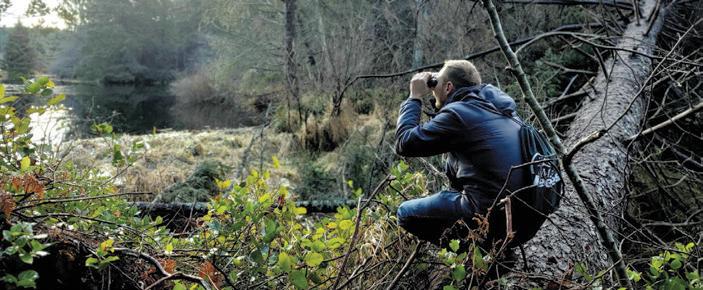
3 minute read
Ducks Unlimited Canada’s MarshKeepers Protect Nature’s Treasures, One Wetland at a Time
Ducks Unlimited Canada’s MarshKeepers Protect Nature’s Treasures, One Wetland at a Time
Weekend mornings are filled with relaxation and leisure for many, but for some extraordinary families and individuals in British Columbia, these days are dedicated to a greater purpose. Clad in green hats and work gloves, people with a passion for conservation volunteer to be MarshKeepers.
Craig Little and Darin Brown are two such conservation champions. Little, a retired teacher administrator and avid outdoorsman, and Brown, a wildlife enthusiast with roots in the Maritimes, dedicate their time to Ducks Unlimited Canada’s (DUC) MarshKeepers program. Their commitment goes beyond altruism; a love for the environment motivates them to act. “If everybody does a little, it adds up to something significant,” said Little.
WHO ARE THE MARSHKEEPERS?
With limited field staff to oversee the hundreds of thousands of acres of wetlands and other natural habitats that DUC stewards across the province, the MarshKeepers
program enlists volunteers to lend their eyes and ears on the ground. They are “citizen scientists” who contribute valuable information that supports DUC’s conservation efforts.
Armed with marsh-keeping kits, they document plant and animal sightings, report any damage to the land or wetlands, and clean up any litter they find. Vital information on the state of infrastructure, such as dams, signs, bridges, fences and more, is collected, and invasive species are reported when seen. Volunteers can enter their observations on an app on their smartphone, uploading the data in real-time.
Brown sees the value in these efforts: “Science plays a huge role; you can’t manage what you don’t know. Information provided by MarshKeepers allows conservation experts to make critical decisions for managing these landscapes.”
DUC’s MarshKeepers program took flight in British Columbia in 2011, with the first volunteer chapters beginning on Vancouver Island in Nanaimo, Oceanside,
and Comox. Over time, the program has expanded and now includes projects in northern B.C. and on Vancouver Island, encompassing 11 project areas with various wetland features and infrastructure in need of monitoring.

BENEFITS BEYOND CONSERVATION
The program benefits extend beyond conservation as well. As MarshKeepers spend time outside, they enjoy personal growth, relaxation, and the therapeutic benefits of nature. Their experiences expand their wetland knowledge as they discover new landscapes while serving as a champion for the environment, preventing potential hazards and preserving the delicate balance of wetland ecosystems.
“It’s a really good idea, which allows people to record their observations,” said Little. “This gives people a chance to get outdoors, contribute to conservation, and help DUC at the same time. I call that a win-win-win.”
MORE MARSHKEEPERS, MORE CONSERVATION OPPORTUNITIES
DUC’s B.C. MarshKeepers Program has set ambitious goals. There are plans to introduce the program to three new regions, enroll more volunteers, expand monitoring to 20 active project sites, and develop data and communication processes to encourage MarshKeepers to support continuous program improvement. Recruiting and retaining volunteers remain vital to the program's success, and there are efforts to attract new volunteers of all ages.
Brown is confident that the program will continue: “A lot of volunteers want to be on the ground making a difference, and there's an opportunity to do that in the MarshKeepers program. There’s a lot of interest and I’m sure it will spread.”
The role of a MarshKeeper is crucial to accurately monitoring our precious wetlands, and the land welcomes all who are interested in contributing. If you find yourself longing for a meaningful weekend experience, consider becoming a MarshKeeper. Together, we can protect and enjoy the natural wonders that surround us.
Become a MarshKeeper by emailing volunteer@ducks.ca and mentioning the B.C. program.










